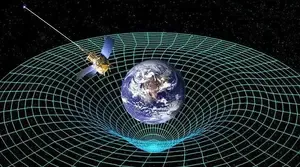The quantum universe, a microscopic realm that challenges our intuitive understanding of the world, has intrigued scientists and philosophers since it was introduced in the early 20th century. In this subatomic realm, particles behave in strange and seemingly contradictory ways, defying the classical laws of Newtonian physics. Wave-particle duality, for example, reveals that subatomic particles, such as electrons and photons, can exhibit both particle and wave characteristics, depending on the circumstances.
Quantum superposition is another perplexing phenomenon, where particles can exist in multiple states simultaneously. This concept was encapsulated in the famous Schrödinger's cat thought experiment, which illustrates how a cat could be alive and dead at the same time depending on the quantum state of an associated particle.
Quantum Entanglement: An Intricate Web of Invisible Connections
Quantum entanglement not only challenges the foundations of classical physics, but also raises the intriguing possibility of quantum communication, an emerging field at the intersection of physics and computer science. The ability to transmit information instantly, regardless of distance, suggests the existence of a quantum communication channel that escapes the limitations imposed by the speed of light.
This phenomenon has revolutionary implications for information technology. Quantum cryptography, for example, is based on the property of quantum entanglement to ensure the security of communications, since any attempt to intercept or observe the quantum state of entangled particles would alter their state, alerting users to the presence of intruders.
Furthermore, quantum entanglement has been explored in the field of quantum computing, where quantum bits, or qubits, can exist in superposition, enabling exponentially greater processing capacity than classical bits. This promising approach could revolutionize computing by tackling complex problems that are beyond the capabilities of traditional computers.
Thus, quantum entanglement is not just a theoretical enigma, but also a bridge to technological innovations that could transform the way we deal with information and computation. As we unlock the secrets of quantum entanglement, we open the doors to a new chapter in the exploration and application of quantum physics, shaping not only our understanding of the universe, but also the future of technology.
Heisenberg's Uncertainty: Insurmountable Limits of Accuracy
Werner Heisenberg introduced the uncertainty principle, a cornerstone of quantum physics that sets fundamental limits to the precision with which we can measure certain properties of a particle. This theory states that it is impossible to simultaneously accurately know the position and velocity of a particle. The more precisely we measure one of these properties, the less precision we will have in measuring the other.
Heisenberg uncertainty is not a technical limitation, but an intrinsic characteristic of the quantum universe. This challenges our intuition, which is based on the deterministic precision of the macroscopic world, and leads us to question the foundations of objective reality. In addition to the Heisenberg uncertainty, wave-particle duality is another surprising phenomenon that challenges our conventional understanding of reality.
This duality reveals that subatomic particles can behave both as particles and as waves, depending on the experimental context. When observed as particles, they have a defined location; when observed as waves, they manifest interference patterns. This dualism suggests that the fundamental nature of particles is not fixed, but depends on how we choose to observe them. This not only questions the objective nature of reality, but also highlights the crucial role of the observer in determining particle behavior.
The Role of Consciousness: Philosophy and Metaphysical Implications of Quantum Physics
The Copenhagen interpretation, proposed by Niels Bohr and Werner Heisenberg, is one of the most influential approaches in trying to understand the role of consciousness in the quantum universe. According to this interpretation, conscious observation not only influences the measurement, but is crucial to the collapse of the wave function, determining the observed result. This means that quantum reality is shaped by the observer's consciousness in a way that challenges our classical understanding of an independent, objective reality.
This perspective, while revolutionary, raises profound philosophical questions about the nature of existence. If consciousness is intrinsically linked to the creation of reality, we are challenged to rethink the traditional separation between subject and object. The classical view of an external world, independent of the mind that observes it, is questioned by the quantum perspective, which suggests a fundamental interconnection between the observer and the observed.
The philosophical implications extend beyond physics, influencing our broader understanding of consciousness and the nature of existence itself. If consciousness plays a fundamental role in determining reality, the possibility arises that human experience, mind, and matter are more intertwined than we realize. This insight challenges established paradigms, instigating debates about the nature of the mind, free will, and the nature of reality itself.
Ultimately, the interaction between consciousness and the quantum universe transcends the limits of physics, entering the territory of philosophy and metaphysics. We are facing a crossroads where the boundaries between the observer and the observed become more tenuous, leading us to contemplate the essential nature of existence in its most fundamental and enigmatic form. The quantum universe not only challenges our scientific conceptions, but also calls us to a deep reflection on the nature of consciousness and its intrinsic relationship with the reality we inhabit.

Conclusion: Unraveling the Riddles of the Quantum Universe
By exploring the quantum universe, we delve into a realm of mysteries and challenges to our understanding of the world. Wave-particle duality, quantum entanglement, Heisenberg uncertainty, and philosophical implications offer a fascinating and complex overview of the fundamental nature of reality. These enigmas not only expand our scientific horizons, but also urge us to rethink the foundations of our conceptions about the nature of existence.
The quantum universe is not just a field of study for physicists, but an invitation to deeper exploration of the frontiers of knowledge and human consciousness itself. As we continue to unlock the secrets of the quantum microcosm, we are destined to redefine and expand our understanding of the vast and mysterious universe we inhabit.
